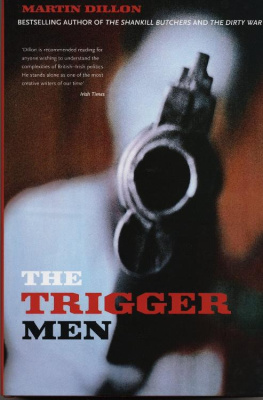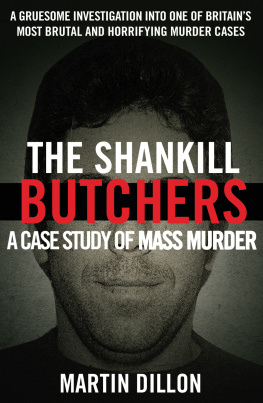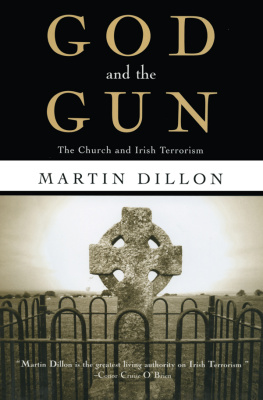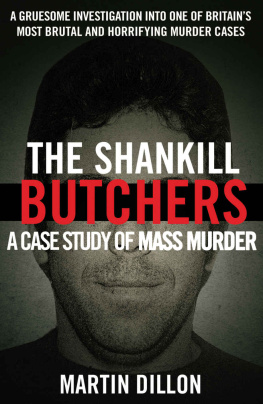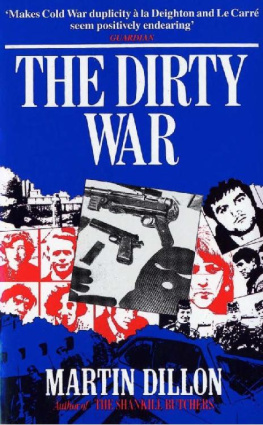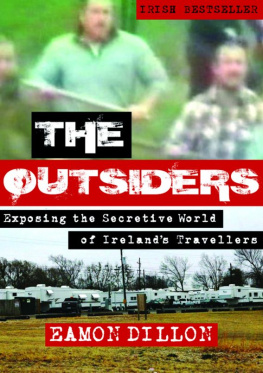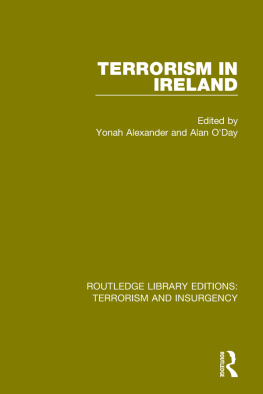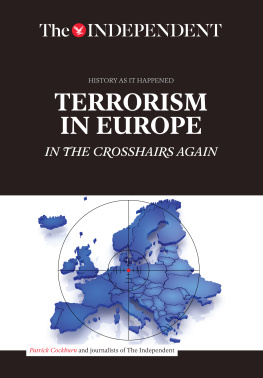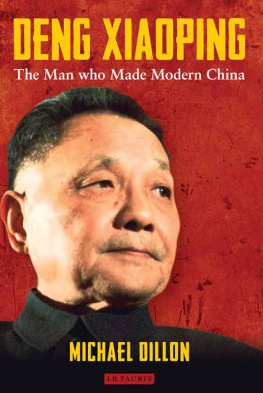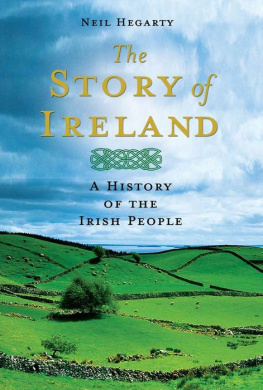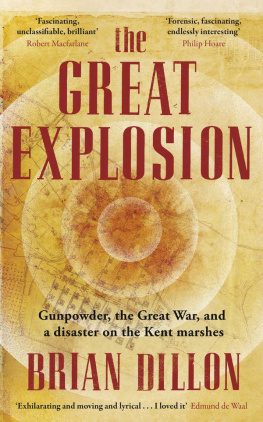THE AUTHOR
MARTIN DILLON is the author of the bestsellers, The Shankill Butchers and The Dirty War. They are regarded as two of the best books written on the Ireland conflict. His distinguished career began in newspapers and he later became a programme editor with the BBC and a writer/producer for its award-winning Timewatch. After 18 years with the BBC he became a terrorism expert for Sky Television a role he subsequently went on to fill with US and Canadian television networks, notably featuring on CNN and CBS. Dillons contacts within US Intelligence and with intelligence services in Eastern Europe make him one of the best-informed writers on the subject. He lives in New York with his wife, Violeta Kumurdjieva, a Bulgarian journalist and writer.
ALSO BY MARTIN DILLON:
Non-Fiction
Political Murder in Northern Ireland (with Denis Lehane)
Rogue Warrior of the SAS (with Roy Bradford)
The Shankill Butchers
The Dirty War
Killer in Clowntown
The Enemy Within
Twenty-five Years of Terror
God and the Gun
The SAS Legend
The Assassination of Robert Maxwell: Israels Super Spy
(with Gordon Thomas)
Fiction
The Serpents Tail
Plays
The Squad
The Waiting Room
The Dog
The Wall
Eyes of the Dead
Screenplays
Other Mens Flowers
Terror Inc.
THE TRIGGER MEN
Martin Dillon
This eBook is copyright material and must not be copied, reproduced, transferred, distributed, leased, licenced or publicly performed or used in any way except as specifically permitted in writing by the publishers, as allowed under the terms and conditions under which it was purchased or as strictly permitted by applicable copyright law. Any unauthorised distribution or use of this text may be a direct infringement of the authors and publishers rights and those responsible may be liable in law accordingly
Epub ISBN: 9781780573762
Version 1.0
www.mainstreampublishing.com
This edition, 2004
Copyright Martin Dillon, 2003
All rights reserved
The moral rights of the author have been asserted
First published in Great Britain in 2003 by
MAINSTREAM PUBLISHING COMPANY (EDINBURGH) LTD
7 Albany Street
Edinburgh EHI 3UG
ISBN 1 84018 902 9
Reprinted 2004
No part of this book may be reproduced or transmitted in any form or by any means without written permission from the publisher, except by a reviewer who wishes to quote brief passages in connection with a review written for insertion in a magazine, newspaper or broadcast
A catalogue record for this book is available from the British Library
CONTENTS
ACKNOWLEDGEMENTS
To interviewees and secondary sources I would like to express a debt of gratitude, without them my task would have been much more difficult. Many had been questioned before but felt that because a decent time interval had elapsed, they could provide me with additional information with the benefit of honest recall. Some still work in the security forces and, like others who have retired from intelligence work, they wanted their identities protected.
I also owe a great deal to my publisher, Bill Campbell, for his persuasiveness and support and to Graeme Blaikie, the Mainstream editorial coordinator. My wife, Violeta, slaved over the manuscript as it progressed and kept me focused while she constantly checked facts and syntax.
It would not be possible to write books about the Ireland conflict without an important intellectual input from friends. They include my parents, Gerard and Maureen, and two superb retired detectives Jimmy Nesbitt and Johnston Jonty Brown; the journalist and writer, Hugh Jordan and his editor at Sunday World, Jim McDowell; and Trevor Hanna, who has been a stalwart of journalism in Ireland.
Jim Campbell is mentioned in this book because his courageous reporting and his friendship have always been important to me. He was one of the few journalists shot and injured because of his writings. The attempt on his life did not deter him from pursuing the truth even though a bullet remains lodged in his spine. Ed Curran, editor of the Belfast Telegraph, and Martin Lindsay, editor of Sunday Life, supported my work from the outset. Ed helped bring my story of the Shankill Butchers to a wide audience.
Others who contributed by their presence in my life include my brother Dr Patrick Dillon and his wife, Lorraine; Damien Dillon, my twin; my sisters, Imelda Feinberg and Ursula and her husband Brian McLoughlin; Eamann McMenamin; Ian Kennedy of Straight Forward Productions and his wife, Cecilia; Moore and Sandra Sinnerton; the journalist Henry McDonald; Colin Lewis; John Nicholson; Dudi and Michael Appleton; Dessie OHagan; John Bach; and A.T.Q. Stewart, one of Irelands finest historians. My thanks and admiration go to the writer Tim Pat Coogan and to Gordon Thomas, my co-author on The Assassination of Robert Maxwell: Israels Super Spy.
Thanks also to friends in Bulgaria, Germany, France, Britain and the United States. Some resist categorisation but they all provided an intellectual impetus to my life: Larry and Iris Gardner of New York City; Vanya and Belin Tsvetkova of Bourgas; Chris and Val Ludlow of St Romain; Charente, who provided a bolthole at a time when I needed one; Alan and Brebner Anderson of London; Crispin Avon, also of London; Jane Fulthorpe, author, and her husband, Colin, of London and St Romain; Kenny McCoy and his sons, Kenny jnr and Conor, of New York; Natatalia Mount, my stepdaughter, and her husband, Andrew Mount, founders of Flux Art Space, also of New York; Climent Atanassov, one of Bulgarias finest artists, of Sofia; Frank Schulte, FBI Special Agent (retired), of San Diego; Eugene Devlin, of New York; Dimiter Kumurdjiev, the outstanding lawyer and EU expert, and his journalist wife, Antonia, of Sofia; Nickolai Berof and Valery Borisov, attorneys, also of Sofia; Russell Smith and Eamon Dornan, lawyers with Smith, Dornan, Shea in Montauk and New York City; Michael Tauck, the eminent film lawyer, of Hamburg; Poli Anatachkova of Sofia; Nickolai Petrov, journalist, also of Sofia; Nadia Katherine Dillon, my daughter, of St Astier, Dordogne; Crawford Anderson Dillon, my stepson, of London; Lucien Mount, my grandson, of New York; Ed Harris, the consummate film actor, of Malibu; Dr Svetlin Ivanov and his wife, Dr Valeria Ivanova, of New York; Plame and Norah Danchev of New York; Hubert and Fess Winstead of North Carolina; David and Monique Alyward of Fonteau, Dordogne; Alain and Patricia Pillaud, also of Fonteau; Francois Bouan, poet-philosopher, and his partner, Agnes the fifty-fifty couple, of Brantome, Dordogne.
Special thanks are due to Angela Wright, and her husband, Kieran, in New York, and to Yvonne Murphy and her staff running the Political Collection of the Linenhall Library, Belfast; as well as to the staff of the Irish News library.
PREFACE
In August 1969, following an invasion of Catholic districts in Belfast by Protestant mobs, British troops arrived in the city as saviours of the Catholic community. Initially, the troops were welcomed like long-lost cousins from across the Irish Sea but that was not to last. Perhaps there was an inevitable naivete on both sides. The British Army knew little about the variables in the Ireland historical mix and Catholic nationalists and republicans were still imbued with an inherited anti-Britishness.
More significant, Northern Irelands Protestant Unionist Government did not have the capacity to reform itself. Despite its record of bigotry and political repression, it was allowed to remain in place. That was the beginning of major political blunders. Leaving the Stormont Government in place permitted Unionists to continue to rule and influence British policy-making in 10 Downing Street. That decision served a narrow Unionist agenda which defined the problem in Northern Ireland as a truculent and subversive Catholic minority. It reflected the unchanging Unionist thesis from the setting up of the State half a century earlier.
Next page
